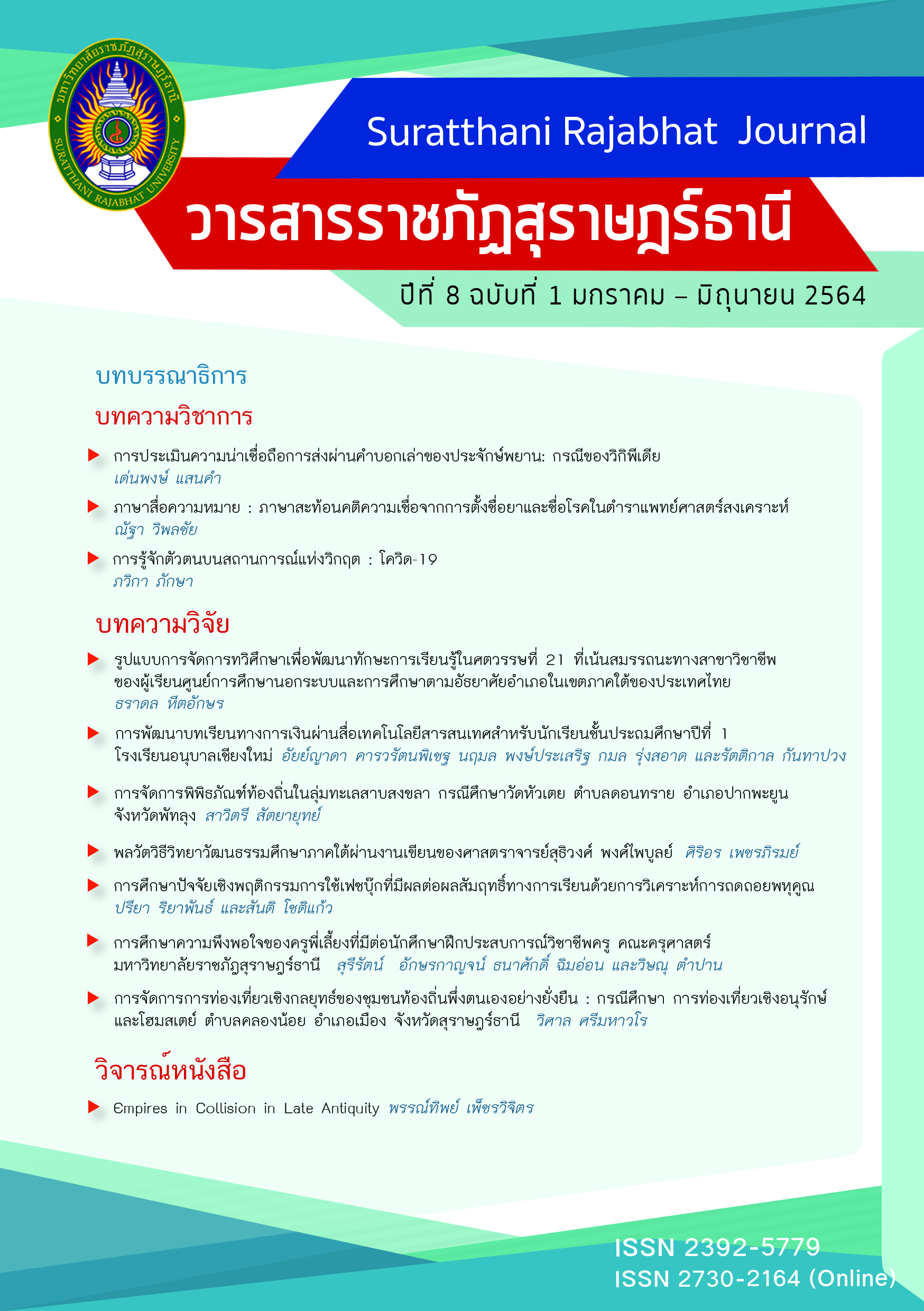Knowing Self in A Crisis Situation: Covid-19
Main Article Content
Abstract
The Coronavirus, or Covid-19, is a new virus that originated in Wuhan, China, and has spread around the world, infected more than 100 million people and caused more than 2 million deaths. It is an epidemic of transcontinental level (Pandemic). This phenomenon has brought tremendous changes to the world population as well as Thai people who have been faced with the new normal in every perspective of their lives. They were required to stay quarantined at home for preventing the spread of virus which gave them a chance to spend their daily time alone. That situation is leading them to obtain an important moment for self-reflection and consideration including a more thorough review of their potential, ability and esteem through various activities in life which are different from normal life time. This article focuses on the opportunities for people to perceive themselves in 3 dimensions: self-efficacy, self-regulation, and self-esteem. It is analyzed and linked to related concepts in psychology and sociology to more deeply understand their own and others’ behaviors.
Article Details
References
กรมควบคุมโรค. (2563a). การประเมินความเสี่ยงการแพร่กระจายเชื้อไวรัสโคโรนาสายพันธุ์ใหม่ 2019 (2019-nCoV) ระหว่างประเทศทั่วอาเซียน. https://ddc.moph.go.th/viralpneumonia/file/RiskAssessment/ThaiVers270163.pdf
กรมควบคุมโรค. (2563b). ผลการสำรวจพฤติกรรมของคนไทย ในการปฏิบัติตามมาตรการป้องกันควบคุมการแพร่ระบาดของโควิด-19. https://www.thaigov.go.th/ infographic/contents/details/2819.
กัลยรัตน์ รอดแก้ว. (2561). ผลของโปรแกรมการกำกับตนเองร่วมกับคู่หูดูแลกันต่อพฤติกรรมการป้องกันโรคเบาหวาน น้ำหนัก และระดับน้ำตาลในเลือดของกลุ่มเสี่ยงโรคเบาหวานที่มีน้ำหนักเกิน. [วิทยานิพนธ์ปริญญาพยาบาลศาสตร มหาบัณฑิต].มหาวิทยาลัยบูรพา.
ข้อกำหนด ออกตามความในมาตรฐาน 9 แห่งพระราชกำหนดการบริหารราชการในสถานการณ์ฉุกเฉิน พ.ศ. 2548 (ฉบับที่ 1). (2563, 25 มีนาคม). ราชกิจจานุเบกษา. เล่มที่ 133 ตอนที่ 69 ง. หน้า 10 - 16.
ข้อกำหนด ออกตามความในมาตรฐาน 9 แห่งพระราชกำหนดการบริหารราชการในสถานการณ์ฉุกเฉิน พ.ศ. 2548 (ฉบับที่ 2). (2563, 2 เมษายน). ราชกิจจานุเบกษา. เล่มที่ 137 ตอนพิเศษที่ 76 ง. หน้า 1.
ณัฐชนน ผุยนวล. (2561). ผลของโปรแกรมการกำกับตนเองด้านการออกกำลังกายด้วยวิธีรำวงย้อนยุคต่อระดับน้ำตาลในเลือดและสมรรถภาพทางกายในกลุ่มผู้เสี่ยงสูงโรคเบาหวานชนิดที่ 2. [วิทยานิพนธ์ปริญญาพยาบาลศาสตรมหาบัณฑิต]. มหาวิทยาลัยบูรพา.
ตฤณ หงษ์ใส และวสันต์ วรรณรัตน์. (2562). กลยุทธ์การกำกับตนเองเพื่อพัฒนาการเขียนของผู้เรียนที่มีความบกพร่องทางการเรียนรู้. วารสารศึกษาศาสตร์ มหาวิทยาลัยขอนแก่น, 42(3), 1-8.
ปุณรภา ตระกูลไพศาล. (2562). ผลของโปรแกรมการกำกับตนเองต่อพฤติกรรมสวมหมวกนิรภัยในบุคลากรเทศบาล อำเภอศรีราชา จังหวัดชลบุรี.[วิทยานิพนธ์ปริญญาพยาบาลศาสตรมหาบัณฑิต].มหาวิทยาลัยบูรพา.
พรสวรรค์ รักเป็นธรรม, ยุววรรณ รัฐกุล และ เสาวณี จันทะพงษ์. (2563). ผลวิกฤต Covid-19 กับธุรกิจเทรนด์ใหม่การขนส่งภายใต้ Next Normal. https://www.bot.or.th/Thai/ResearchAndPublications/DocLib/Article14Apr2020.pdf
มะลิวัลย์ สมบูรณ์, สมนึก ภัททิยธนี และเนตรชนก จันทร์สว่าง. (2560). การเปรียบเทียบผลสัมฤทธิ์ทางการเรียน การรับรู้ความสามารถของตนเอง และการคิดวิเคราะห์ ของนักเรียนชั้นประถมศึกษาปีที่ 6 ระหว่างการจัดกิจกรรมการเรียนรู้แบบกำกับตนเองกับแบบปกติ. วารสารการวัดผลการศึกษา มหาวิทยาลัยมหาสารคาม, 23(พิเศษ), 104 - 117.
รัชดา โตอนันต์. (2563). โควิด-19 โคโรนาไวรัส สงครามที่มองไม่เห็น. วารสารอาหารและยา, 27(2), 4-12.
รัตนาภรณ์ กองแก้ว. (2560). ผลของการส่งเสริมการกำกับตนเองต่อการปฏิบัติเทคนิคปลอดเชื้อในการจัดการแผลของพยาบาลวิชาชีพในแผนกอุบัติเหตุและฉุกเฉิน. [วิทยานิพนธ์ปริญญาพยาบาลศาสตรมหาบัณฑิต].มหาวิทยาลัยเชียงใหม่.
ศุจิรัตน์ ศรีทองเหลือง. (2563). ผลของโปรแกรมการกำกับตนเองต่อพฤติกรรมการควบคุมน้ำหนักและน้ำหนักที่เพิ่มขึ้นตามเกณฑ์ของหญิงตั้งครรภ์ที่มีภาวะน้ำหนักเกินหรืออ้วนก่อนการตั้งครรภ์. [วิทยานิพนธ์ปริญญาพยาบาลศาสตร มหาบัณฑิต] .มหาวิทยาลัยบูรพา.
สุรพล อิสรไกรศีล. (2563). ราชบัณฑิตบัญญัติศัพท์คำว่า “New Normal” การพิจารณาศัพท์บัญญัติและนิยามของคำว่า New Normal [อ้างอิงจากสถานะเฟซบุ๊ค]. https://web.facebook.com/surapol.issaragrisil/posts/102073925591 68907?_rdc=1&_rdr.
ฺBandura, A. (1977). Self-efficacy: Toward a Unifying Theory of Behavioral Changes. Psychological Review, 84(2), 191-215.
Bandura, A. (1991). Social Cognitive Theory of Self-regulation. Organizational Behavior and Human Decision Processes, 50, 248 – 287.
Bandura, A. & Simon, K. (1977). The Role of Proximal Intention in Self-Regulation of Refractory Behavior. Cognitive Therapy and Research, 1(3), 177-193.
Bandura, A. (1986). Social Foundation of Thought and Action: A Social of Cognitive Theory. Englewood Cliffs. Prentice-Hale.
Erikson, E. H. (1963). Childhood and Society. 2th ed. W. W. Norton & Company.
Goffman, E. (1959). The Presentation of Self in Everyday Life. In Newman, D.M. & O’Brien, J. (Eds) Sociology : Exploring the Architecture of Everyday Life Readings, 7th Ed, (2008), pp 120-129. Pine Fovge Press.
Huan, X. MS., Shuanglian, Y. BS. & Yufen, L. BD. (2020). The Psychological Status and Self-Efficacy of Nurses During COVID-19 Outbreak: A Cross-Sectional Survey. Inquiry. https://doi.org/10.1177/00469580 20957114
James, W. (1980). The Principles of psychology. Harvard University Press.
Jansen, R. S., Leeuwen, A. V., Janssen, J., Conijn, R. & Kester, L. (2020). Supporting Learners’ Self-regulated Learning in Massive Open Online Course. Computer & Education, 146, 1-40.
Levine, L. E., & Munsch, J. (2018). Child Development: An Active Learning Approach. 3rd ed. SAGE Publications, Inc.
Maslow, A. H. (1943). A Theory of Human Motivation. Psychological Review, 50, 370-396.
Pragholapati, A. (2020). Self-Efficacy Of Nurses During The Pandemic Covid-19, 1–7.
Rogers, C. R. (1951). Client-Centered Therapy. Hanghton Miffin Company.
Santi, E.A., Gorghiu, G., & Pribeanu, C. (2020). Teachers’ Perceived Self-Efficacy for Mobile Teaching and Learning. Revista Romaneasca pentru Educatie Multidimensionala, 12(1Sup2), 157-166. https:// doi.org/10.18662/rrem/12.1sup1/259
Shavelson, R. J., Hubner, J. J., & Stanton, G. C. (1976). Self-Concept: Validation of Construct Interpretations. Review of Educational Research, 46(3), 407-441.
Slavin, E. R. (2003). Educational psychology theory and practice. Pearson Education, Inc.
Sternberg, R. J., & Williams, W. M. (2010). Educational Psychology. 2nd ed. Pearson Education, Inc.
Vagni, M., Maiorano, T., Giostra, V., & Pajardi, D. (2020). Coping With COVID-19: Emergency Stress, Secondary Trauma and Self-Efficacy in Healthcare and Emergency Workers in Italy. Frontiers in Psychology, 11. doi:10.3389/fpsyg.2020.566912
Wong, J., Baars, M., Davis, D., Zee, T. M., Houben, G. J., & Paas. F. (2019). Supporting Self-Regulated Learning in Online Learning Environments and MOOCs: A Systematic Review, International Journal of Human-Computer Interaction, 35(4-5), 356-373.
World Health Organization. (2021). WHO Coronavirus Disease (COVID-19) Dashboard. https://covid19.who.int/table.
Wulantina. E., Ikashaum. F., Mustika.J., Merliza, P., Loviana, S., Rahmawati, N. I., & Andianto. A. (2020). Self-Efficacy of Mathematics Students on E- Learning During Covid 19 Pandemic. In, International Webinar on Education 2020.
Zimmerman, B. J. (1989). A Social Cognitive View of Self-Regulated Academic Learning. Journal of Educational Psychology, 81(3), 329-339.
Zheng, J., Xing, W., Zhu, G., Chen, G., Zhao, H., & Xie, C. (2019). Profiling Self-Regulation Behaviors in STEM Learning of Engineering Design. Computers & Education, 103669. doi:10.1016/j.compedu.2019.103669.


